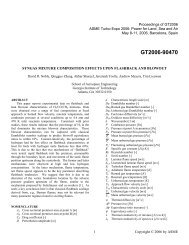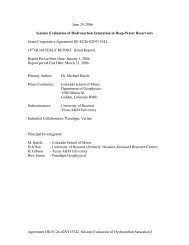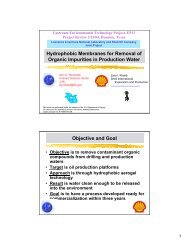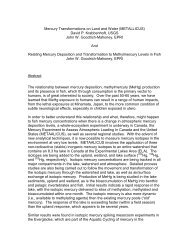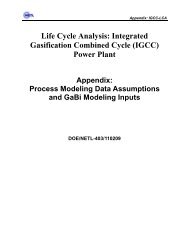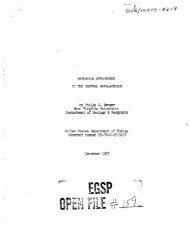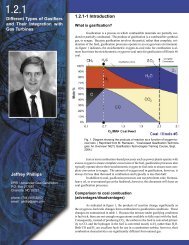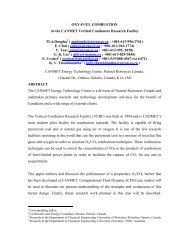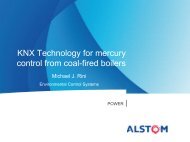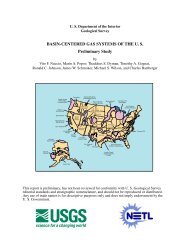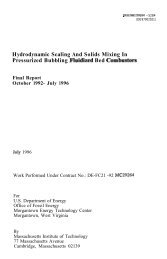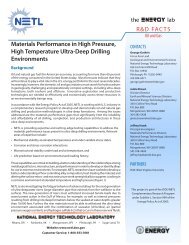Upgrading of Low-Rank Coals - National Energy Technology ...
Upgrading of Low-Rank Coals - National Energy Technology ...
Upgrading of Low-Rank Coals - National Energy Technology ...
Create successful ePaper yourself
Turn your PDF publications into a flip-book with our unique Google optimized e-Paper software.
the addition <strong>of</strong> SynCoal to the firing mix provides<br />
sufficient benefit to more than <strong>of</strong>fset<br />
the increased delivered cost compared to<br />
raw western coal. These requirements have<br />
led RSCP to focus on marketing the product<br />
as a supplemental fuel in utility applications<br />
and then only to units that have specific<br />
problems with slagging or flame stability.<br />
Since SynCoal can not be handled in<br />
conventional unit trains without DSE treatment,<br />
the higher transportation costs to<br />
deliver SynCoal are an additional barrier<br />
to the bulk utility market at this time. DSE<br />
is effective for short haul distances and<br />
storage times, but does decrease the energy<br />
density (Btu/lb) compared to the untreated<br />
SynCoal. The low sulfur content is important<br />
but does not provide any market advantage<br />
since Wyoming Powder River Basin<br />
coals are low in sulfur and currently very<br />
inexpensive.<br />
Industrial Markets<br />
The industrial market segment is much<br />
more amenable to special handling since<br />
these customers normally receive much<br />
smaller quantities and are much more sensitive<br />
to fuel quality issues. RSCP has<br />
developed a technique <strong>of</strong> shipments in<br />
covered hopper rail cars and/or pneumatic<br />
trucks that allows long haul distances and,<br />
when combined with inerted bin storage,<br />
provides safe and efficient handling.<br />
SynCoal has been found to provide<br />
superior performance in direct-fired applications<br />
particularly as a blend with petroleum<br />
coke. SynCoal provides good ignition and<br />
stable flame characteristics while the petroleum<br />
coke is a low-cost product which gives<br />
a longer burning time, expanding the processing<br />
zone. This blend <strong>of</strong> characteristics<br />
has provided a significant advantage to<br />
SynCoal’s cement and quicklime customers.<br />
Additionally, recent tests <strong>of</strong> SynCoal/<br />
petroleum coke blends have shown improved<br />
handling characteristics with regard<br />
to dustiness and self heating.<br />
SynCoal produces a gas-like flame when<br />
burned alone. In some direct-fired applications<br />
(such as road paving asphalt plants),<br />
it can be a much lower cost option than<br />
propane, providing a small but valuable<br />
market.<br />
Metallurgical Markets<br />
SynCoal’s consistent characteristics and<br />
high volatile matter and carbon contents<br />
make it a good reducing agent for some<br />
metallurgical processing applications. Since<br />
low moisture content is a key characteristic<br />
for this segment, the covered hopper rail car<br />
and/or pneumatic truck delivery system is<br />
readily accepted. SynCoal has been used<br />
successfully in ductile iron metal casting<br />
applications as a greensand binder additive<br />
because <strong>of</strong> these characteristics. RSCP has<br />
been working with a metallurgical silica<br />
producer to determine if SynCoal is viable<br />
in their application. RSCP is continuing to<br />
pursue alternative markets in various metallurgical<br />
reduction applications, and SynCoal<br />
may even be a viable substitute for natural<br />
gas used to reduce consumption <strong>of</strong> metallurgical<br />
coke in blast furnaces.<br />
Summary<br />
Rosebud SynCoal has developed an<br />
advanced coal conversion process that has<br />
the potential to enhance the utility and industrial<br />
use <strong>of</strong> low-rank western subbituminous<br />
and lignite coals. Many <strong>of</strong> the power plants<br />
located through the upper Midwest have<br />
cyclone boilers, which burn low ash fusion<br />
temperature coals. Currently, most <strong>of</strong> these<br />
plants burn Illinois Basin high-sulfur coal.<br />
SynCoal is an ideal supplemental fuel for<br />
these and other plants because it allows a<br />
wider range <strong>of</strong> low-sulfur raw coals to be<br />
used to meet more restrictive emissions<br />
guidelines without derating <strong>of</strong> the units or<br />
the addition <strong>of</strong> costly flue gas desulfurization<br />
systems.<br />
The ACCP has potential to convert<br />
inexpensive low-sulfur, low-rank coals<br />
into valuable carbon-based reducing agents<br />
for many metallurgical applications, further<br />
helping to reduce worldwide emissions<br />
and decrease our national dependence on<br />
foreign energy sources.<br />
The ACCP produces a fuel that has<br />
a consistently low moisture content, low<br />
sulfur content, high heating value, and high<br />
volatile content. Because <strong>of</strong> these characteristics,<br />
SynCoal could have significant<br />
impact on SO 2 reduction and provide a<br />
clean, economical alternative fuel to many<br />
regional industrial facilities and small<br />
utility plants, allowing them to remain<br />
competitively in operation.<br />
21



